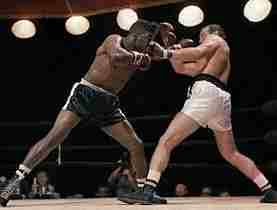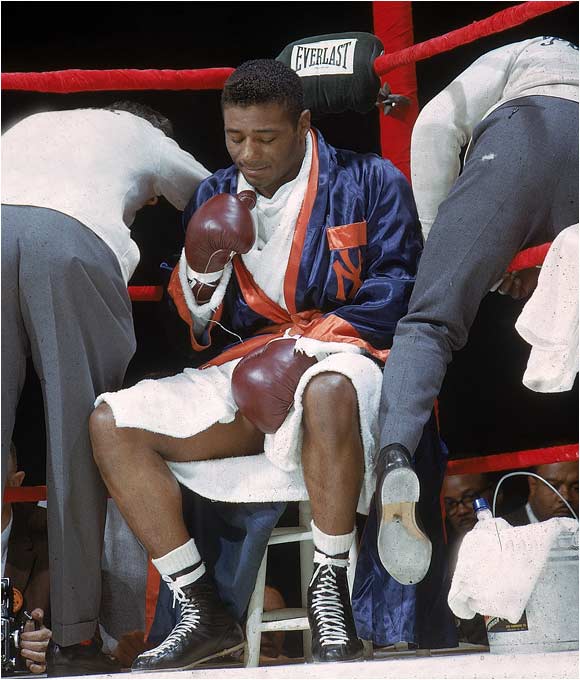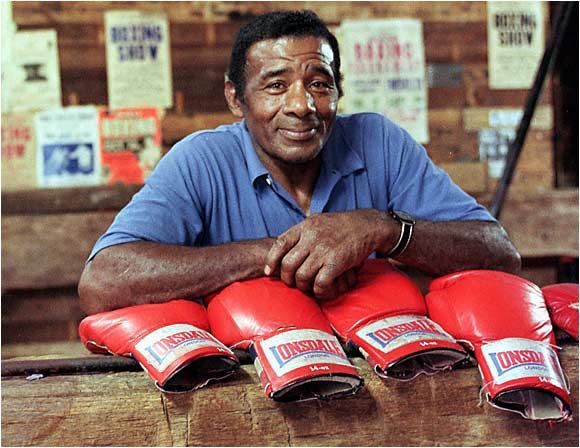| Floyd Patterson, a gentleman
boxer who emerged from a troubled boyhood to become the world
heavyweight champion, died yesterday at his home in New Paltz, N.Y. He
was 71. The cause was prostate cancer
and Alzheimer's disease, said a grandson, Kevin McIlwaine.
In the 1952 Helsinki Olympics, Patterson won
the middleweight gold medal with five knockouts in five bouts. Then,
in a 20-year professional career, he won 55 bouts, lost 8 and fought 1
draw. His total purses reached $8 million, a record then.
He won the heavyweight title twice, knocking
out Archie Moore and Ingemar Johansson. In the first instance he
became the youngest heavyweight champion up until that time; in the
second, he became the first fighter to regain the title. He also lost
the title twice, defended it successfully seven times and failed to
regain it three times. He generally weighed little more than 180
pounds, light for a heavyweight, but he made the most of mobility,
fast hands and fast reflexes.
He was a good guy in the bad world of boxing.
He was sweet-tempered and reclusive. He spoke softly and never lost
his boyhood shyness. Cus D'Amato, who trained him throughout his
professional career, called Patterson "a kind of a stranger." Red
Smith, the New York Times sports columnist, called him "the man of
peace who loves to fight."
Patterson acknowledged his sensitivity.
"You can hit me and I won't think much of
it," he once said, "but you can say something and hurt me very much."
W. C. Heinz, the boxing columnist, found a
fundamental difference between Patterson the fighter and Patterson the
person.
"In expressing himself as a fighter," Heinz
wrote, "Patterson knows almost complete security. Outside the ring, he
knows no such security. A shy, sensitive soul-searcher, he volunteers
little. He might be called a conversational counterpuncher. When he
does speak out, however, it is with a purity reminiscent of Joe
Louis."
Floyd Patterson (he had no middle name) was
born Jan. 4, 1935, in a cabin in Waco, N.C., the third eldest of 11
children. His father, Thomas, was a laborer and his mother, Annabelle,
was a domestic who later worked in a bottling plant until the family
moved to the Bedford-Stuyvesant section of Brooklyn.
Above the youngster's bed was a picture of
him with two older brothers and an uncle, all boxers. Referring to
himself, he often told his mother, "I don't like that boy," and once
he scratched three large X's over his face in the picture.
He became a frequent truant who fell behind
in school. At 11, he could not read or write. He would not talk, and
when someone talked to him, he refused to look that person in the
face.
His mother had him committed to Wiltwyck
School, a facility in upstate New York for emotionally disturbed boys.
His new teachers helped him learn to read and encouraged him to take
up boxing there, which he did.
A year and a half later, Patterson returned
home. He attended Public School 614 for maladjusted children and
Alexander Hamilton Vocational High School before quitting after one
term to help support his family.
At 14, he started working out at the Gramercy
Gym on the Lower East Side of Manhattan, a battered facility owned and
run by the iconoclastic D'Amato. In 1950, he also started boxing as an
amateur. In 1951, Patterson won the New York Golden Gloves open
middleweight title. In 1952, after his Olympic success, he turned
professional.
His first pro bout earned him only $300, but
by 1956 he had become a leading heavyweight. When Rocky Marciano
retired that year as the undefeated champion, Patterson was matched
against Moore, the light-heavyweight champion, for the heavyweight
title.
For the fight, on Nov. 30 in Chicago Stadium,
Patterson rode to the event with Sam Taub, the veteran broadcaster and
reporter. As Taub recalled, "He sat there gazing out of the window
like he was going to the movies."
When they arrived, Patterson put on his
trunks, socks, boxing shoes and robe, stretched out on a rubbing table
and went to sleep. A few hours later, he stopped the 42-year-old Moore
in five rounds and, at 21, became the youngest heavyweight champion to
that point.
Patterson defended the title willingly but uncomfortably. In 1957,
he knocked out Pete Rademacher in six rounds in Seattle, and in 1958
he stopped Roy Harris, who was known as Cut 'n Shoot, in 12 rounds in
Los Angeles after both fighters had knocked him down.
On June 26, 1959, at Yankee Stadium, Patterson lost the title when
Johansson knocked him down seven times before the referee stopped the
bout in the third round. But he became the first heavyweight to regain
the title when he knocked out Johansson in the fifth round at the Polo
Grounds on June 20, 1960. "It was worth losing the title for this,"
Patterson said. "This is easily the most gratifying moment of my life.
I'm champ again, a real champ this time."
Patterson and Johansson met in a third title fight on March 13,
1961, in Miami Beach. After being knocked down twice, Patterson
knocked out Johansson in the sixth round, although some ringsiders
thought Johansson had climbed off the canvas by the count of 10.
The boxing historian Bert Sugar said by telephone yesterday: "You
try to tell people how kind Patterson was and how difficult it was to
reconcile that with boxing. In their second fight, Patterson knocks
him silly, then picks him up and drags him back to his corner. I've
never seen anything like that in the world of sports."
The glory days ended with Patterson's two title fights against
Sonny Liston. On Sept. 25, 1962, in Chicago, Liston knocked out
Patterson in the first round and became the champion. An embarrassed
Patterson drove home wearing dark glasses and a fake mustache and
beard. But he insisted on a return bout because, he said, "If I
stopped now, that would be running away."
"I did that when I was a kid," he added. "I've grown out of that."
The return bout came on July 22, 1963, in Las Vegas, and the result
was the same — Liston by a knockout in the first round. Patterson kept
fighting after that, but never at his championship level.
In 1965 in Las Vegas, with Patterson hiding a back injury, Muhammad
Ali all but tortured him before winning in 12 rounds. In 1970 in
Madison Square Garden, Ali opened a seven-stitch cut over Patterson's
left eye and beat him in seven rounds.
After Patterson finally retired in 1972, he became a respected
frontman for his sport. In 1983, he told a Congressional subcommittee:
"I would not like to see boxing abolished. I come from a ghetto, and
boxing is a way out. It would be pitiful to abolish boxing because you
would be taking away the one way out."
From 1977 to 1984, he was a member and from 1995 to 1998 the
chairman of the New York State Athletic Commission, which supervised
boxing in the state. He led a successful campaign to have the state
mandate thumbless gloves and thus reduce eye injuries.
In April 1998, while giving a deposition, his short-term memory
failed. He could not remember the names of his two fellow commission
members or his secretary or office routines. He resigned the next day.
Patterson is survived by his wife, Janet, whom he married in 1965;
their two daughters, Jennifer Patterson of Kingston, N.Y., and Janine
Patterson of New Paltz; and an adopted son, Tracy Harris Patterson, of
Highland, N.Y., whom he guided to the World Boxing Council's
super-bantamweight title in 1992. He is also survived by two sons and
two daughters from a previous marriage, Floyd, Eric, Seneca and Trina;
three brothers, Sherman, Raymond and Alvin; two sisters, Deanna and
Carolyn; and eight grandchildren. Further information about those
family members was not available.
Patterson was voted into the United States Olympic Committee Hall
of Fame in 1987 and the International Boxing Hall of Fame in 1991. The
public loved him. As Dave Anderson wrote in 1972 in The Times:
"He projects the incongruous image of a gentle gladiator, a martyr
persecuted by the demons of his profession. But his mystique also
contains a morbid curiosity. Any boxing fan worth his weight in The
Ring record books wants to be there for Floyd's last stand. Until
then, Floyd Patterson keeps boxing, the windmills of his mind turned
by his own breezes." |






![]()